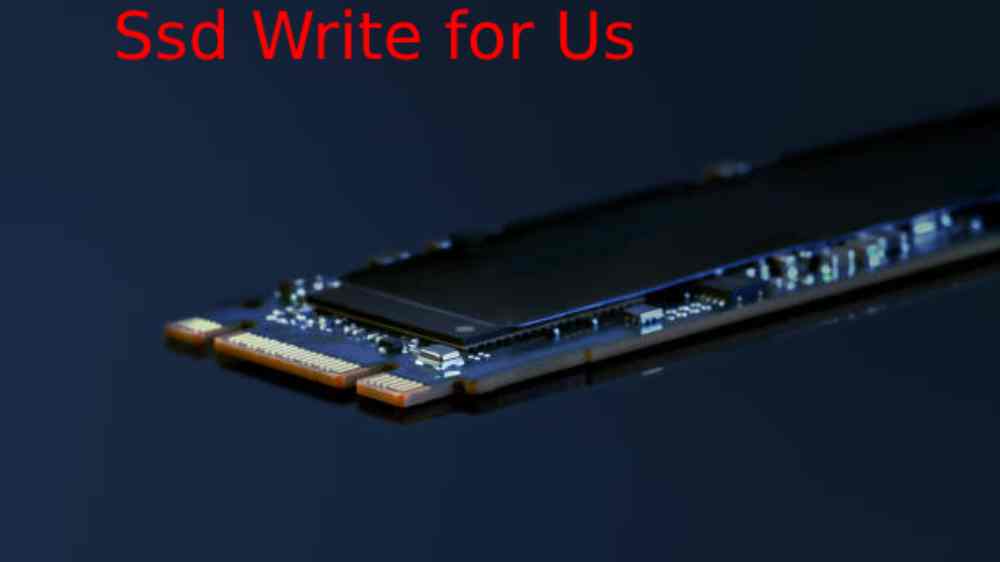Ssd Write for Us
“SSD” stands for “Solid State Drive.” It’s a data storage device that uses NAND-based flash memory to store data persistently. SSDs have gained popularity due to their faster performance, lower power consumption, and more excellent durability than traditional Hard Disk Drives (HDDs). Here are some critical points about SSDs:
Flash Memory Technology: SSDs use NAND-based flash memory, which stores data in memory cells. These cells retain data even when the power is turned off.
Performance: SSDs are significantly faster than HDDs because they don’t rely on spinning disks and moving parts. This leads to more immediate data access, boot times, and application loading.
Durability and Reliability: SSDs are more durable than HDDs because they lack moving components. This makes them less susceptible to physical shock and damage.
Energy Efficiency: SSDs consume less power than HDDs, which can help extend the battery life of laptops and reduce power usage in desktop systems.
Form Factors: SSDs come in various form factors, including 2.5-inch drives (similar to traditional HDDs), M.2 drives (smaller and more compact), and PCIe (high-speed interface) SSDs.
Types of SSDs
- SATA SSDs: These use the same interface as traditional HDDs, making them compatible with most systems.
- NVMe SSDs: Non-volatile memory Express (NV Me) SSDs use a faster PCIe interface for better performance.
- Capacity: SSDs come in various capacities, from small accommodations suitable for operating systems to more considerable abilities for storing media and files.
- Cost: While SSDs are more expensive per gigabyte than HDDs, their prices have decreased over time, making them more accessible.
- Usage: SSDs are use in various devices, including laptops, desktop computers, servers, and even in data centers for high-performance storage.
- Hybrid Systems: Some systems use a combination of SSD and HDD, where the SSD is used for frequently accessed data, while the HDD is use for bulk storage.
- Wear Leveling: SSDs use wear-leveling algorithms to distribute data write/erase cycles across memory cells, prolonging the drive’s lifespan.
- Data Recovery: Data recovery from a failed SSD can be more challenging than HDDs due to how data is stored on NAND flashy memory.
Overall, SSDs have transformed the storage landscape, offering improved speed, durability, and efficiency compared to traditional HDDs. They are widely used in consumer electronics, enterprise systems, and data-intensive applications.
How to Update Your Articles?
Once your article is prepared, you could publish it to the journal. You can generally put up your document by using this email: contact@theslashgear.com
Why Write for theslashgear – Ssd Write for Us
- If you write to us, your commercial enterprise is centered, and the patron can study your article; you could have massive publicity.
- This will help construct relationships together with your beleaguered target audience.
- If you write for us, the discernibility of your brand and comprise worldly.
- Our presence is also on social media, and we percentage your article on social channels.
- You box the link lower back for your website inside the article, sharing search engine optimization costs with your internet site.
Search Terms Related to Ssd
SSD technology
How do SSDs work?
SSD vs HDD comparison
Benefits of using SSDs
SSD types and form factors
SATA SSD vs NVMe SSD
SSD performance benchmarks
SSD lifespan and durability
SSD installation and setup
Choosing the right SSD
Upgrading to SSD
SSD for gaming
SSD for laptops
PCIe SSD vs SATA SSD
M.2 SSD explained
SSD caching technology
SSD data recovery
Best practices for SSD maintenance
SSD price trends
SSD market overview
Search Terms for Ssd Write for Us
SSD technology + write for us
Benefits of using SSDs + guest post
SATA SSD vs NV Me SSD + submit article
SSD performance benchmarks + write for us
SSD types and form factors + guest contributors
Choosing the right SSD + submit guest post
Upgrading to SSD + write for us
SSD for gaming + guest blogging
SSD installation guide + write for us
SSD maintenance tips + contributor guidelines
M.2 SSD explained + submit article
SSD data recovery methods + write for us
PCIe SSD vs SATA SSD + guest writers
SSD caching technology + submit guest post
SSD market trends + write for us
Article Guidelines on Theslashgear – Ssd Write for Us
- We at Theslashgear welcome fresh and unique content related to Ssd.
- Theslashgear allows a minimum of 500+ words related to Ssd.
- The editorial team of Theslashgear does not encourage promotional content related to Ssd.
- For publishing an article at Theslashgear, email us at contact@theslashgear.com
- Theslashgear allows articles related to Tech, Al, Apps, Digital Marketing, and many more
- Link to a minimum of 5 write for our pages.

